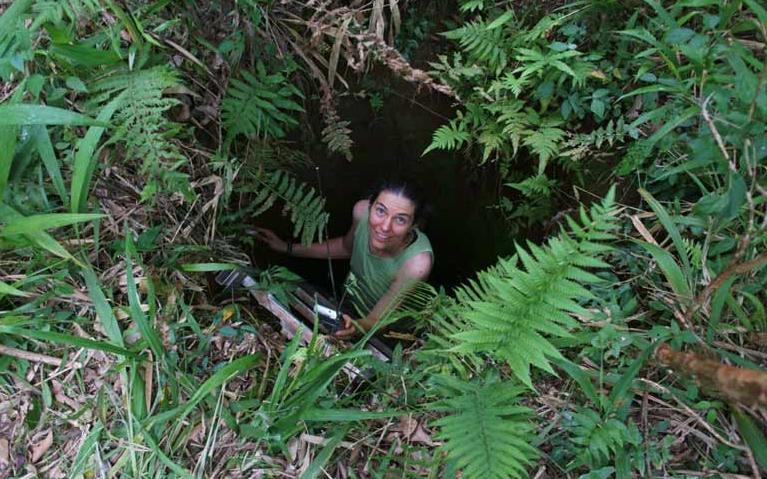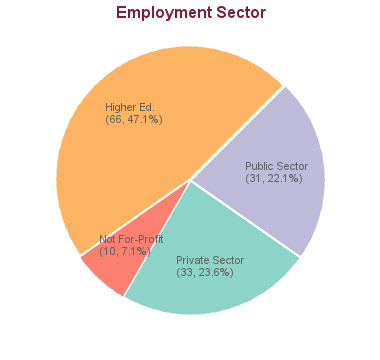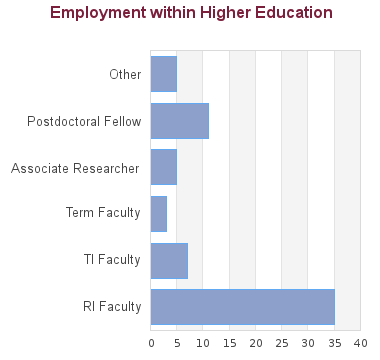
Kristina Cockle
Job Title
Research Scientist
Employer
CONICET

Review details about the recently announced changes to study and work permits that apply to master’s and doctoral degree students. Read more
Forestry graduate students learn from a dynamic and diverse group of researchers who educate and communicate how forests and the products that are created from them contribute to the well-being of all living things. The health and sustainability of forests and the people who depend on them underlies everything we do. We are among the best institutions globally in forest-related education and research and are also unique in the breadth of expertise we possess, which allows us to integrate new knowledge across many disciplines.
PhD in Forestry students can be found all over the world; they are important ambassadors for UBC Forestry and demonstrate just how diverse and international in scope the research is that is undertaken in our Faculty. We have approximately 130 doctoral students in any given year, which is about 40% of our total Forestry graduate student population. In addition to being part of the Faculty of Forestry, PhD students are also considered members of one of our three Faculty departments, based on their supervisor's affiliation.
The Faculty of Forestry offers excellent courses and cutting edge research across a spectrum of disciplines related to forestry, and opportunities for interdisciplinary learning. Graduate students work with leading scientists in state-of-the-art facilities within the Forest Sciences Centre and at any of two research forests.
We are one of the largest graduate units on campus, with over 300 students enrolled in our 7 degree programs. We attract students from around the world, with over 40 countries represented in our community. Given the global nature of modern forestry, the experience our students gain by working with colleagues from around the world is a subtle but effective means of creating the global citizens that UBC aspires to produce.
The major requirement for the PhD in Forestry is completion of a research dissertation which meets the requirements of the Faculty of Graduate & Post-doctoral Studies. Advancement to Candidacy must be achieved within 24 months of the start of studies, the requirements of which include a comprehensive examination. Course work is not required for the Forestry PhD, although many doctoral students do complete courses (either for credit or audit) as recommended by their supervisory committee.
The Faculty of Graduate and Postdoctoral Studies establishes the minimum admission requirements common to all applicants, usually a minimum overall average in the B+ range (76% at UBC). The graduate program that you are applying to may have additional requirements. Please review the specific requirements for applicants with credentials from institutions in:
Each program may set higher academic minimum requirements. Please review the program website carefully to understand the program requirements. Meeting the minimum requirements does not guarantee admission as it is a competitive process.
Applicants from a university outside Canada in which English is not the primary language of instruction must provide results of an English language proficiency examination as part of their application. Tests must have been taken within the last 24 months at the time of submission of your application.
Minimum requirements for the two most common English language proficiency tests to apply to this program are listed below:
Overall score requirement: 100
Reading
23
Writing
24
Speaking
22
Listening
23
Overall score requirement: 7.0
Reading
6.5
Writing
6.5
Speaking
6.5
Listening
6.5
Some programs require additional test scores such as the Graduate Record Examination (GRE) or the Graduate Management Test (GMAT). The requirements for this program are:
The GRE is not required.
Students admitted to the Ph.D. degree program normally possess a master's degree in Forestry or a related area, with clear evidence of research ability or potential. Transfer from the master's to the Ph.D. program is permitted under Faculty of Graduate and Postdoctoral Studies regulations. Exceptional students may be admitted directly to the Ph.D. program from the bachelor's level.
Deadline to submit online application. No changes can be made to the application after submission.
Transcript DeadlineDeadline to upload scans of official transcripts through the applicant portal in support of a submitted application. Information for accessing the applicant portal will be provided after submitting an online application for admission.
Referee DeadlineDeadline for the referees identified in the application for admission to submit references. See Letters of Reference for more information.
All applicants have to submit transcripts from all past post-secondary study. Document submission requirements depend on whether your institution of study is within Canada or outside of Canada.
A minimum of three references are required for application to graduate programs at UBC. References should be requested from individuals who are prepared to provide a report on your academic ability and qualifications.
Many programs require a statement of interest, sometimes called a "statement of intent", "description of research interests" or something similar.
Students in research-based programs usually require a faculty member to function as their thesis supervisor. Please follow the instructions provided by each program whether applicants should contact faculty members.
Securing the interest of a prospective faculty supervisor is a vital step in the PhD, MSc and MASc application process, and interest must be confirmed before you submit the online application. Using the prospective supervisor list at , carefully review faculty members whom you consider to be the best match with your research interests. Make a short-list of prospective supervisors and contact them to see if they are accepting new students. Remember that faculty members receive many inquiries, so generic e-mails may not receive a response. Make your correspondence stand out: tell potential supervisors about your background and interests and how this relates to their research area. As part of your conversation with a prospective supervisor, it is important to discuss funding. UBC Forestry requires that supervisors have a minimum funding package planned for the student prior to an Offer of Admission being issued. Your online application should only be submitted after a prospective supervisor has confirmed to you that they are interested in reviewing your application.
Permanent Residents of Canada must provide a clear photocopy of both sides of the Permanent Resident card.
All applicants must complete an online application form and pay the application fee to be considered for admission to UBC.
| Fees | Canadian Citizen / Permanent Resident / Refugee / Diplomat | International |
|---|---|---|
| Application Fee | $116.25 | $168.25 |
| Tuition * | ||
| Installments per year | 3 | 3 |
| Tuition per installment | $1,875.34 | $3,294.66 |
| Tuition per year (plus annual increase, usually 2%-5%) | $5,626.02 | $9,883.98 |
| Int. Tuition Award (ITA) per year (if eligible) | $3,200.00 (-) | |
| Other Fees and Costs | ||
| Student Fees (yearly) | $1,144.10 (approx.) | |
| Costs of living | Estimate your costs of living with our interactive tool in order to start developing a financial plan for your graduate studies. | |
Applicants to UBC have access to a variety of funding options, including merit-based (i.e. based on your academic performance) and need-based (i.e. based on your financial situation) opportunities.
From September 2024 all full-time students in UBC-Vancouver PhD programs will be provided with a funding package of at least $24,000 for each of the first four years of their PhD. The funding package may consist of any combination of internal or external awards, teaching-related work, research assistantships, and graduate academic assistantships. Please note that many graduate programs provide funding packages that are substantially greater than $24,000 per year. Please check with your prospective graduate program for specific details of the funding provided to its PhD students.
All applicants are encouraged to review the awards listing to identify potential opportunities to fund their graduate education. The database lists merit-based scholarships and awards and allows for filtering by various criteria, such as domestic vs. international or degree level.
Many professors are able to provide Research Assistantships (GRA) from their research grants to support full-time graduate students studying under their supervision. The duties constitute part of the student's graduate degree requirements. A Graduate Research Assistantship is considered a form of fellowship for a period of graduate study and is therefore not covered by a collective agreement. Stipends vary widely, and are dependent on the field of study and the type of research grant from which the assistantship is being funded.
Graduate programs may have Teaching Assistantships available for registered full-time graduate students. Full teaching assistantships involve 12 hours work per week in preparation, lecturing, or laboratory instruction although many graduate programs offer partial TA appointments at less than 12 hours per week. Teaching assistantship rates are set by collective bargaining between the University and the Teaching Assistants' Union.
Academic Assistantships are employment opportunities to perform work that is relevant to the university or to an individual faculty member, but not to support the student’s graduate research and thesis. Wages are considered regular earnings and when paid monthly, include vacation pay.
Canadian and US applicants may qualify for governmental loans to finance their studies. Please review eligibility and types of loans.
All students may be able to access private sector or bank loans.
Many foreign governments provide support to their citizens in pursuing education abroad. International applicants should check the various governmental resources in their home country, such as the Department of Education, for available scholarships.
The possibility to pursue work to supplement income may depend on the demands the program has on students. It should be carefully weighed if work leads to prolonged program durations or whether work placements can be meaningfully embedded into a program.
International students enrolled as full-time students with a valid study permit can work on campus for unlimited hours and work off-campus for no more than 24 hours a week during academic sessions.
A good starting point to explore student jobs is the UBC Work Learn program or a Co-Op placement.
Students with taxable income in Canada may be able to claim federal or provincial tax credits.
Canadian residents with RRSP accounts may be able to use the Lifelong Learning Plan (LLP) which allows students to withdraw amounts from their registered retirement savings plan (RRSPs) to finance full-time training or education for themselves or their partner.
Please review Filing taxes in Canada on the student services website for more information.
Applicants have access to the cost estimator to develop a financial plan that takes into account various income sources and expenses.
154 students graduated between 2005 and 2013: 2 are in non-salaried situations; for 12 we have no data (based on research conducted between Feb-May 2016). For the remaining 140 graduates:


These statistics show data for the Doctor of Philosophy in Forestry (PhD). Data are separated for each degree program combination. You may view data for other degree options in the respective program profile.
| 2023 | 2022 | 2021 | 2020 | 2019 | |
|---|---|---|---|---|---|
| Applications | 55 | 59 | 44 | 63 | 37 |
| Offers | 31 | 33 | 26 | 33 | 19 |
| New Registrations | 24 | 27 | 24 | 29 | 16 |
| Total Enrolment | 157 | 150 | 142 | 132 | 121 |
Students in research-based programs usually require a faculty member to function as their thesis supervisor. Please follow the instructions provided by each program whether applicants should contact faculty members.
Securing the interest of a prospective faculty supervisor is a vital step in the PhD, MSc and MASc application process, and interest must be confirmed before you submit the online application. Using the prospective supervisor list at , carefully review faculty members whom you consider to be the best match with your research interests. Make a short-list of prospective supervisors and contact them to see if they are accepting new students. Remember that faculty members receive many inquiries, so generic e-mails may not receive a response. Make your correspondence stand out: tell potential supervisors about your background and interests and how this relates to their research area. As part of your conversation with a prospective supervisor, it is important to discuss funding. UBC Forestry requires that supervisors have a minimum funding package planned for the student prior to an Offer of Admission being issued. Your online application should only be submitted after a prospective supervisor has confirmed to you that they are interested in reviewing your application.
These videos contain some general advice from faculty across UBC on finding and reaching out to a supervisor. They are not program specific.
| Year | Citation |
|---|---|
| 2019 | Forest harvesting affects the stability of stream ecosystems by altering organic matter flows. Dr. Yeung studied how and why leaf litter breakdown and quantity vary across space and time in natural and logging-affected streams. His findings provide new directions for managing forests and watersheds to sustain the ecological integrity of streams. |
| 2019 | Dr. Liu examined the structural behaviour of typical cross-laminated timber (CLT) connections, commonly used in multi-story buildings. Work entailed robust experimental setup, a mechanism-based model and detailed parameter study. This research increases our understanding of the structural performance of the CLT connections under complex loading. |
| 2019 | Dr. Barron explored the multiple ways suburban trees can be configured to maximize a range of benefits for the local community. Using a scenario approach that was informed by local residents, urban forest practitioners, and academics, she concluded that future forests can thrive in more dense suburban landscapes. |
| 2019 | Dr. Ramey explored how water and nutrient additions influenced invertebrates communities and leaf litter decomposition near small streams in British Columbia. Her work has applications to wildlife conservation and forest management of riparian zones in the Pacific Northwest, and contributes to our understanding of riparian headwater ecosystems. |
| 2018 | Dr. de Paula studied the effectiveness of riparian buffer management strategies to protect stream ecosystems in agricultural landscapes of the Amazon. These strategies were retaining forests in place and land abandonment for natural regeneration. He found that both strategies were effective, contributing to more sustainable agriculture practices |
| 2018 | Dr. van der Zwan studied the factors limiting production of renewable biomass-based products. Through insights in rheology and enzymology, he revealed the underlying causes of key limitations and the mechanisms by which enzymes can be used to overcome them. This work betters our understanding of what is required to develop a sustainable bioeconomy. |
| 2018 | Dr. Elleouet studied spruce populations in Alaska to understand how expanding forests evolve in a changing climate. She found that the trees' long time to maturity and the capacity to disperse pollen across large distances might help these forests keep a healthy level of genetic diversity. She also explored the use of genomic data to infer past demographic changes in natural tree populations. |
| 2018 | Dr. Bass studied the fate of upstream migrating adult Pacific salmon that encounter fishing nets but escape or are released. He found that some net types cause higher mortality than others and that biological factors may have a large impact on survival. |
| 2018 | Dr. Gallagher developed an inexpensive and repeatable method to link historical land use to groundwater contamination. She subsequently applied her method to an aquifer on the US-Canada border to better understand the build up of nitrate in our drinking water. |
| 2018 | Dr. San-Miguel developed a novel framework using Landsat satellite data to improve our understanding of historical fire patterns across the Canadian boreal forest. When applied, the framework produced new information for 507 fires. This work increases our understanding of fire mortality and fire burn behaviour that was not previously known. |
Forestry offers advanced study in natural and social science, management, and economic aspects of forestry and wood science, in an interdisciplinary setting.
Departments/Programs may update graduate degree program details through the Faculty & Staff portal. To update contact details for application inquiries, please use this form.

This city won’t disappoint. It has it all: sea, parks, mountains, beaches and all four seasons, including beautiful summers and mild, wet winters with snow.